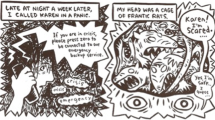Abstract
Illness is an occasion for autobiography, and memoirs of illness present openings to ethical ways of living. This work describes illness memoirs as performative, creating the self they claim as their origin. The self that is claimed is dialogical, and the tension of this dialogue is to include the voices of others without assimilating these voices to one's own. Physician memoirs, a spiritual autobiography, and a web site are presented as examples of dialogical autobiographical work occasioned by illness.
Similar content being viewed by others
REFERENCES
Atkinson, P. (1997). Narrative turn or blind alley? Qualitative Health Research, 7, 325–344.
Becker, G. (1997). Disrupted lives: Howpeople create meaning in a chaotic world.Berkeley: University of California Press.
Bjorklund, D. (1998). Interpreting the self: Two hundred years of American autobiography.Chicago: The University of Chicago Press.
Bluebond-Langer, M. (1996). In the shadow of illness: Parents and siblings of the chronically ill child.Princeton: Princeton University Press.
Broyard, A. (1992). Intoxicated by my illness: And other writings on life and death.NewYork: Clarkson Potter.
Bury, M. (1982). Chronic illness as biographical disruption.Sociology of Health and Illness, 4, 167–182.
Campo, R. (1997). The poetry of healing: A doctor's education in empathy, identity, and desire.New York: Norton.
Clark, K., & Holquist, M. (1984). Mikhail Bakhtin.Cambridge: Harvard University Press.
Dentith, S. (1995). Bakhtinian thought: An introductory reader.London: Routledge.
Ellis, C., & Bochner, A.P. (forthcoming). Bringing the first-person voice into qualitative research: The primacy of personal experience. In N. Denzin & Y. Lincoln (Eds.), Handbook of qualitative research, 2nd edition. Thousand Oaks, CA: Sage.
Frank, A.W. (1991). At the will of the body: Reflections on illness.Boston: Houghton Mifflin.
Frank, A.W. (1993). The rhetoric of self-change: Illness experience as narrative.Sociological Quarterly, 34, 39–52.
Frank, A.W. (1995). The Wounded Storyteller: Body, illness, and ethics.Chicago: The University of Chicago Press.
Frank, A.W. (1997a). Enacting illness stories: When, what, and why.In H. Nelson (Ed.), Stories and their limits: Narrative approaches to bioethics (pp. 31–49). New York: Routledge.
Frank, A.W. (1997b). Illness as moral occasion: Restoring agency to ill people.Health, 1, 131–148.
Frank, A.W. (1997c). Narrative witness to bodies: a reply to Alan Radley.Body & Society, 3, 103–109.
Frank, A.W. (1998a). Just listening: Narrative and deep illness.Families, Systems & Health, 16, 197–212.
Frank, A.W. (1998b). Stories of sickness as care of the self.Health, 2, 329–348.
Frank, A.W. (1998c). Bodies, sex, and death.Theory, Culture & Society, 15, 417–425.
Gardiner, M. (1992). The dialogics of critique: M.M. Bakhtin & the theory of ideology.London: Routledge.
Gardiner, M. (1996). Alterity and ethics: A dialogical perspective.Theory, Culture & Society, 13, 121–143.
Garro, L. (1992). Chronic illness and the construction of narratives.In M.-J.D. Good, P.E. Brodwin, B.J. Good, & A. Kleinman (Eds.), Pain as human experience: An anthropological perspective (pp. 100–137).Berkeley: The University of California Press.
Goffman, E. (1959). The presentation of self in everyday life.Garden City, NY: Doubleday Anchor.
Goffman, E. (1963). Stigma: Notes on the management of spoiled identity.Englewood Cliffs, NJ: Prentice Hall.
Goffman, E. (1974). Frame analysis: An essay on the organization of experience.New York: Harper Colophon.
Hofstadter, D. (1979). Godel, Escher, Bach: An eternal golden braid.New York: Basic Books.
Holquist, M. (1990). Dialogism: Bakhtin and his world.London: Routledge.
Kleinman, A. (1988). The illness narratives: Suffering, healing & the human condition.New York: Basic Books.
Levinas, E. (1989). Ethics as first philosophy.In S. Hand (Ed.), The Levinas reader (pp. 75–87). Oxford: Blackwell.
Lorde, A. (1980). The cancer journals.San Francisco: spinsters/aunt lute.
McLellan, F. (1997a). The electronic narrative of illness.Unpublished doctoral dissertation, Graduate School of Biomedical Sciences, The University of Texas Medical Branch at Galveston.
McLellan, F. (1997b). ”A whole other story”: The electronic narrative of illness.Literature and Medicine, 16, 88–107.
Morley, D., & Chen, K.-H. (1996). Stuart Hall: Critical dialogues in cultural studies.London: Routledge.
Parsons, T. (1951). The social system.New York: Free Press.
Price, R. (1994). A whole new life: An illness and a healing.New York: Plenum.
Robillard, B. (1997). Book review: A.W. Frank, The wounded storyteller. Body & Society, 3, 115–116.
Sharf, B.F. (1997). Communicating breast cancer on-line: Support and empowerment on the Internet.Women & Health, 26, 65–84.
Simmel, G. (1950). The sociology of Georg Simmel.Ed. & trans. by K. Wolff.New York: Free Press.
Styron, W. (1990). Darkness visible: A memoir of madness.New York: Random House.
Taylor, C. (1991). The malaise of modernity.Concord, Ontario: Anansi.
Trilling, L. (1971). Sincerity and authenticity.Cambridge: Harvard University Press.
Verghese, A. (1994). My own country: A doctor's story of a town and its people in the age of AIDS.New York: Simon & Schuster.
Verghese, A. (1998). The tennis partner: A doctor's story of friendship and loss.New York: Harper Collins.
Williams, B. (1998). Naked before God: The return of a broken disciple.Harrisburg, PA: Morehouse.
Williams, W.C. (1984). The doctor stories.New York: New Directions.
Woodward, K. (Ed.) (1997). Identity and difference.London: Sage.
Author information
Authors and Affiliations
Rights and permissions
About this article
Cite this article
Frank, A.W. Illness and Autobiographical Work: Dialogue as Narrative Destabilization. Qualitative Sociology 23, 135–156 (2000). https://doi.org/10.1023/A:1005411818318
Issue Date:
DOI: https://doi.org/10.1023/A:1005411818318




